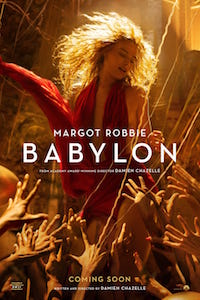Oscar-winning director Damien Chazelle's "Babylon" is best discussed by working backwards. Of course, there won't be any spoilers as to how Chazelle ends his big, vibrant, and entirely unwieldy Hollywood epic, but it's the best part of the movie and worthy of praise. All early screenings and reviews have suggested that the ending is divisive, and no consensus has emerged as to how Chazelle lands his three-plus-hour plane, but he does so perfectly.
It's everything else before it that's the problem. If not a problem, then a rocky journey to its conclusion.
Chazelle operates in rarified air in Hollywood. He's a 37-year-old director who is in the Oscar history books as the youngest Best Director winner in history (for his gorgeous 2016 musical "La La Land"). That kind of success early in your career can be simultaneously liberating and overwhelming - but Chazelle seems to be in a spot where very few questions are asked about his projects, because "Babylon" does not seem like a movie that took to heart any studio notes. That can be frustrating because there's a lot of great moments and spectacle on display, but "Babylon" often buckles under Chazelle's ambitions.

From the jump, "Babylon" warns you that it will not compromise (for instance, there's an exaggerated scene of elephant defecation mere minutes into the movie). The movie's plot doesn't seem important to anyone - especially Chazelle - because "Babylon" is about testing audiences' boundaries.
In its simplest form, "Babylon" is about trying to make it in Hollywood. Certainly it could be deeper than that, but everyone in the film is chasing a dream in Los Angeles, with the hopes of seeing those dreams actualized on a giant silver screen. Manny (newcomer Diego Calva) hopes to make it in Hollywood, one way or another, and he finds his way to a big Hollywood party. At the party, dripping in cocaine and sex, he meets Nellie LaRoy (Margot Robbie, in a larger-than-life performance), who exudes movie star charisma but hasn't quite made it yet.
The movie spends its three-hour runtime tracking the ups-and-downs of the characters' careers in Hollywood. "Babylon" begins in the 1920s when the silent era was flourishing, and ends with the introduction of the talkie. Manny's career doesn't follow the same trajectory as Nellie's, and Nellie's doesn't follow the same trajectory of actor Jack Conrad's (Brad Pitt, in one of his strongest performances). It's about how everyone adapts to a changing industry (an idea that still resonates today) and how the industry adapts to their talents.
When a movie like "Babylon" comes out, it's often labeled as a "love letter to cinema." That feels a bit disingenuous to the hard edge that "Babylon" so desperately portrays, using its glimpse into old Hollywood to show off a perceived level of excess and debauchery. Chazelle is a passionate filmmaker, but his latest would benefit from a bit of introspection; it operates entirely on the surface until the last act, instead savoring tedious and overlong party scenes. There is a scene between Jack and gossip columnist Elinor St. John (Jean Smart, relishing in playing a Hedda Hopper type) that slows down the movie's tempo with notes of melancholy. It's quite possibly the best scene in the entire movie.
But, the last act. What a last act it is. Chazelle has always been a master of film endings, from the tense performance scene in "Whiplash," to the heartbreaking finale of "La La Land," and the powerful scene that closes out "First Man." When the credits roll on "Babylon," it makes you wonder if the three hours that came before were worth it.
| Movie title | Babylon |
|---|---|
| Release year | 2022 |
| MPAA Rating | R |
| Our rating | |
| Summary | Damien Chazelle takes a trip back to Old Hollywood. It’s a long, long trip. |